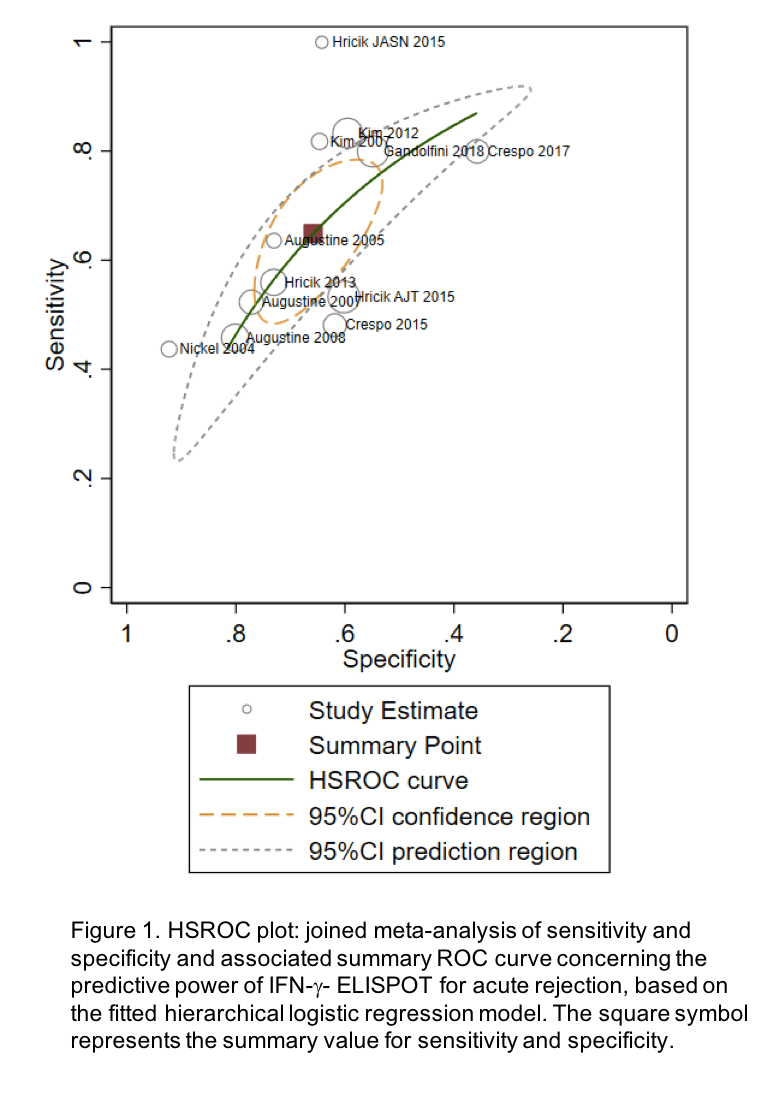Pre-Transplant Donor-Specific IFN-γ ELISPOT as a Predictor of Allograft Rejection: A Diagnostic Test Accuracy Meta-Analysis
S. Farouk1, I. Gandolfini2, N. Montero3, E. Crespo4, M. Jarque4, M. Meneghini4, U. Maggiore2, O. Bestard3, P. Cravedi1
1Medicine, Division of Nephrology, Icahn School of Medicine at Mt. Sinai, New York, NY, 2Centro Trapianti Rene-Pancreas, Azienda Ospedaliera-Universitaria di Parma, Parma, Italy, 3Nephrology, Bellvitge University Hospital, Barcelona, Spain, 4Experimental Nephrology Laboratory. IDIBELL, Barcelona, Spain
Meeting: 2019 American Transplant Congress
Abstract number: A150
Keywords: Kidney transplantation, Meta-analysis, T cell activation
Session Information
Session Name: Poster Session A: Biomarkers, Immune Monitoring and Outcomes
Session Type: Poster Session
Date: Saturday, June 1, 2019
Session Time: 5:30pm-7:30pm
 Presentation Time: 5:30pm-7:30pm
Presentation Time: 5:30pm-7:30pm
Location: Hall C & D
*Purpose: Pre-transplant interferon-γ (IFN-γ) enzyme-linked immunospot (IFN- γ ELISPOT) has been proposed as a tool to quantify alloreactivity of memory T cells and estimate the risk of acute rejection (AR) after kidney transplantation, but results varied significantly across studies. We performed a meta-analysis to evaluate the association between pre-transplant IFN-γ ELISPOT and AR and assess its predictive accuracy at the individual level.
*Methods: We searched 3 databases for studies testing pre-transplant IFN- γ ELISPOT as a predictor of AR after kidney transplantation. We estimated the pooled summary of odds ratio (OR) for AR and then joined sensitivity and specificity for predicting AR using random-effects and hierarchical summary receiving operating characteristic (HSROC) model. We employed meta-regression models with the Monte Carlo permutation method to adjust for multiple tests to explain sensitivity and specificity heterogeneity across studies. The meta-analytic estimates of sensitivity and specificity were used to calculate positive and negative predictive values (PPV and NPV) across studies.
*Results: The analysis included 12 studies and 1,181 patients. IFN-γ ELISPOT was significantly associated with increased AR risk (OR: 3.29, 95% CI, confidence interval: 2.34-4.60, Figure 1). HSROC jointly estimated sensitivity and specificity values of 64.9% (95% CI: 53.7-74.6%), and 65.8% (95% CI: 57.4-73.5%), respectively, with moderate heterogeneity across studies. After adjusting for multiple testing, meta-regression models showed that thymoglobulin induction, recipient black ethnicity, living-vs-deceased donor, and geographical location did not affect sensitivity or specificity. Because of the varying AR incidence of the studies, PPV and NPV ranged between 16% – 60% and 70% – 95%, respectively.
*Conclusions: Pre-transplant IFN-γ ELISPOT is significantly associated with increased risk of AR but provides suboptimal predictive ability at the individual level.
To cite this abstract in AMA style:
Farouk S, Gandolfini I, Montero N, Crespo E, Jarque M, Meneghini M, Maggiore U, Bestard O, Cravedi P. Pre-Transplant Donor-Specific IFN-γ ELISPOT as a Predictor of Allograft Rejection: A Diagnostic Test Accuracy Meta-Analysis [abstract]. Am J Transplant. 2019; 19 (suppl 3). https://atcmeetingabstracts.com/abstract/pre-transplant-donor-specific-ifn-%ce%b3-elispot-as-a-predictor-of-allograft-rejection-a-diagnostic-test-accuracy-meta-analysis/. Accessed February 28, 2026.« Back to 2019 American Transplant Congress

